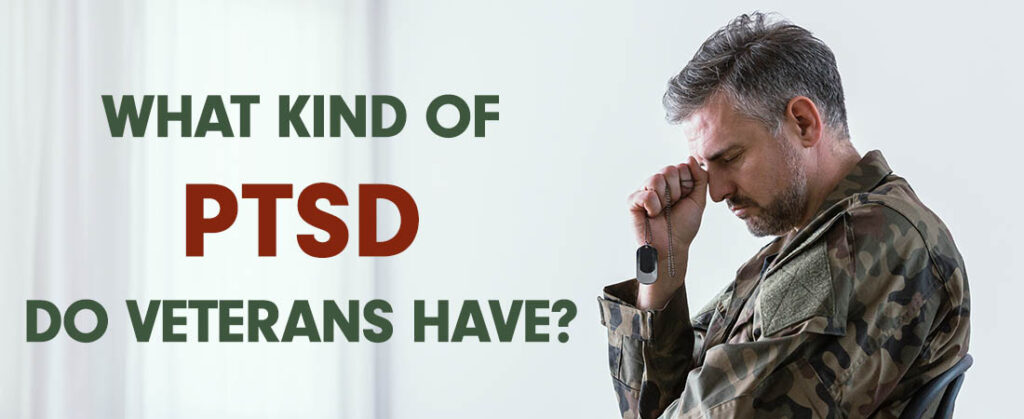What Kind of PTSD Do Veterans Have?
Are you struggling to readjust to civilian life? Are you on edge?
On the verge of panic? Explosive anger? Or the opposite, are you feeling emotionally numb? Disengaged? Disconnected?
Are you concerned that you will never feel normal again?
For far too many veterans these are common experiences, the lingering symptoms of untreated post-traumatic stress disorder (PTSD).
What is Post-Traumatic Stress Disorder?
PTSD is a mental health condition which can develop after you experience or witnesses a very stressful or traumatic event.
Experiences like military combat, disasters, assault and sexual assault can result in PTSD. With PTSD, your thoughts or emotions are disrupted by recurring intrusive thoughts and recollections of the event to the degree it negatively impacts your everyday life.
Symptoms of PTSD can include:
- Reliving the event – Veterans with PTSD may have recurring nightmares or flashbacks of traumatic events. Sometimes images, sounds or even smells can trigger a flashback or cause emotional distress.
- Avoiding situations that remind you of the event – Avoiding large crowds or places that remind you of a traumatic event is common.
- Negative changes in beliefs or feelings – Relationships may become difficult after a traumatic event since PTSD can cause you to feel negative feelings towards others and relationships in general.
- Hyperarousal – When we are stressed, a hyper-arousal triggers our fight-or-flight instinct. In most cases, when the event is over, we are able to calm down and the fight-or-flight response subsides. However, someone suffering PTSD symptoms may find themselves in a state of hyperarousal, in which the fight-or-flight response does not subside and instead causes them to feel jittery, unable to sleep, easily startled or unsafe in everyday, nonthreatening situations.
Does this sound like you or someone you love? Please know you are not alone. We are here to help. Call and speak with someone right now. (855) 222-4756
What Causes PTSD?
PTSD occurs after you’ve experienced severe trauma or a life-threatening event.
It is normal for your mind and body to be in shock after such an event, but this normal response becomes PTSD when your nervous system gets stuck. How does this happen?
Your nervous system has two automatic or reflexive ways of responding to stressful events:
- Mobilization, or as you may have heard it mentioned our fight-or-flight instinct, occurs when you need to defend yourself or survive the danger of a combat situation. Your heart pounds faster, your blood pressure rises, and your muscles tighten, increasing your strength and reaction speed. Once the danger has passed, your nervous system calms your body, lowering your heart rate and blood pressure, allowing you to return to a normal balance.
- Immobilization occurs when you’ve experienced too much stress in a situation and even though the danger has passed, you find yourself stuck. Your nervous system is unable to return to its normal state of balance and you are unable to move on from the event. This is PTSD.
Recovering from PTSD involves transitioning out of the mental and emotional war zone you are still living in, helping your nervous system to become unstuck.
If you or a veteran you love is struggling with PTSD, we can help. With proper diagnosis and treatment, a healthy and fulfilling life beyond PTSD is possible. Renewal can start today.
PTSD Risk Factors
We don’t know why some soldiers develop PTSD while others don’t, but we do know that the incidence goes up with the number of deployments and the amount of combat you have experienced.
This isn’t surprising, considering many symptoms of PTSD—like hypervigilance, hyperawareness, and adrenaline-quick reflexes—helped you survive when you were deployed.
It’s only now that you’re back home that these responses are inappropriate.
We Can Help You
Becoming unstuck doesn’t happen overnight, but with proper treatment and by working at it day by day, you can reclaim your life and happiness.
At Honey Lake Clinic, the #1 Christian Residential Behavioral Health Treatment Program in America, we can help you learn the skills and the tools you need to reclaim your life. PTSD doesn’t have to have the last word.
We know it is difficult living with untreated PTSD and discouraging to endure the long lines at the VA. Call now and speak with someone who understands … and cares.
The Honey Lake Difference
At Honey Lake Clinic, our experienced staff, licensed therapists, psychologists, and psychiatrists understand that effective treatment for PTSD requires a multifaceted approach, involving healing of the mind, body, and spirit.
